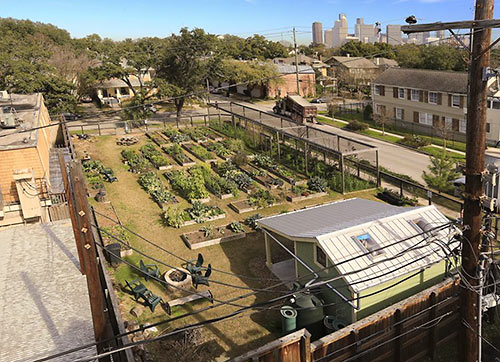
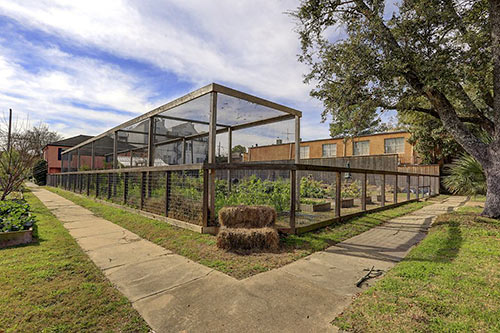
Last week a for-sale sign went up at the 8,400-sq.-ft. vacant lot at the corner of Kipling and Stanford that’s been used for the past several years as an Audubon Place community garden. And there it was on MLS, available for $630K: the former homesite William Winkler had bought in 2012 and parceled out for neighborhood veggie-growing efforts, now offered as “the only lot in the Audubon Place Historic District that’s available to build a new construction home.“
Greenleaf Gardens began operating on the site in May 2012, after Winkler purchasing the lot for $300,000. Subscribers rented out 4-ft.-by-20-ft. raised-bed plots on the property.
Winkler considers the garden operation a success; he says he’s selling only because of a change in his personal financial situation. Several users of the garden have indicated they’d be willing to pay significantly higher annual subscription fees. Earlier this week, Winkler sent out an email indicating he’s open to another option: selling the property to a nonprofit that would keep the garden running.
***
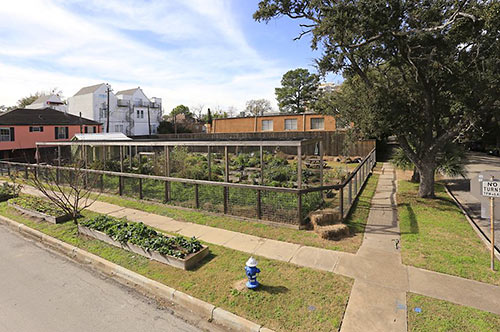
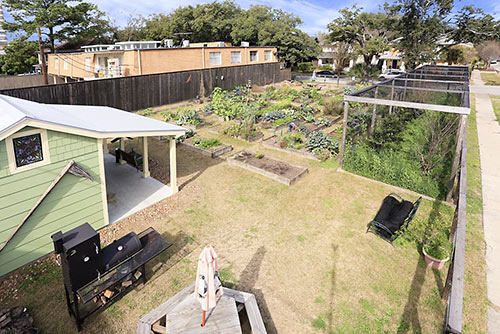
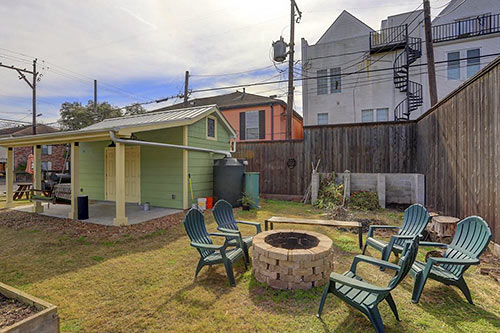
A neighbor had suggested Winkler “start a nonprofit and crowd fund the purchase of the lot.” In the email, Winkler says he’s willing to try something like that, though he’s not interested in running any nonprofit himself. His email is meant to gauge interest in this kind of approach — the Audubon Place civic association, he suggests, could be the purchaser.
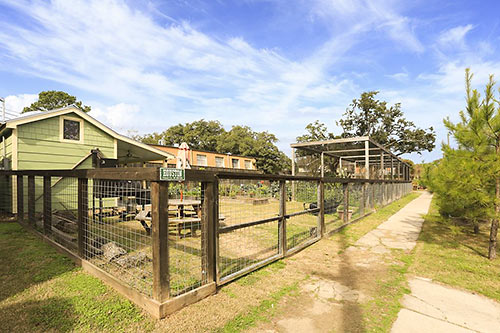
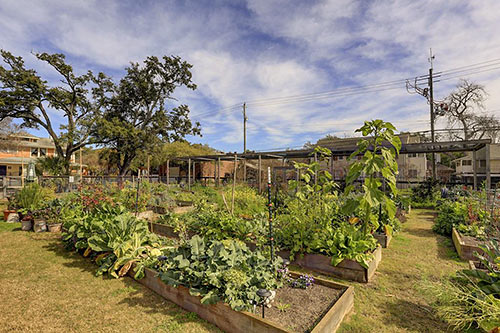
“Fact is, he writes, “I need to sell the lot and I would love to save the garden at the same time. If there seems to be enough interest I will approach the APCA to see what they think possible. If they did decide to go ahead with a crowd funding effort and enough funds were raised I would discount the purchase price 20% from the listed price.”
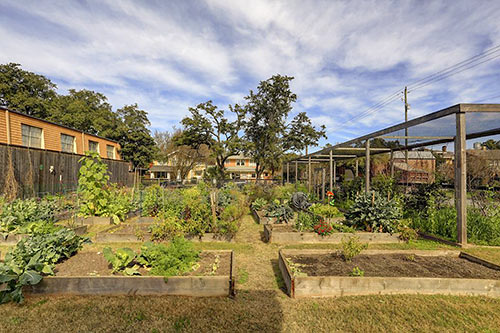
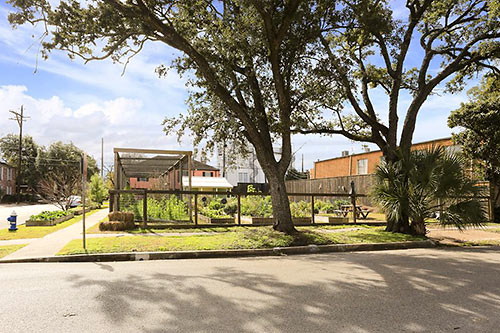
- 803 Kipling St. [HAR]
- Previously on Swamplot: Leasing Garden Apartments on a Vacant Lot in Audubon Place
Photos: HAR



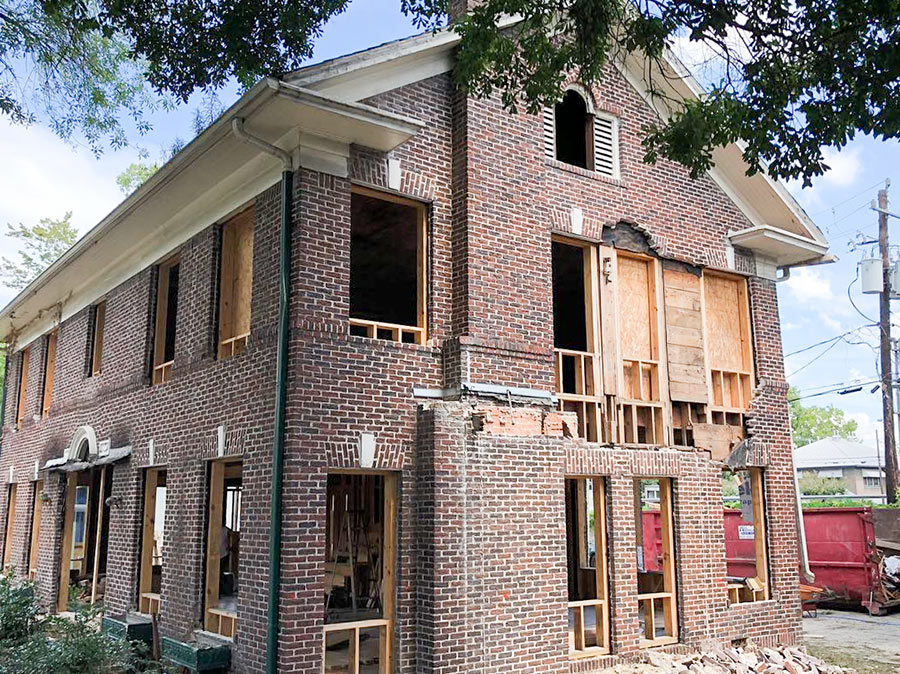
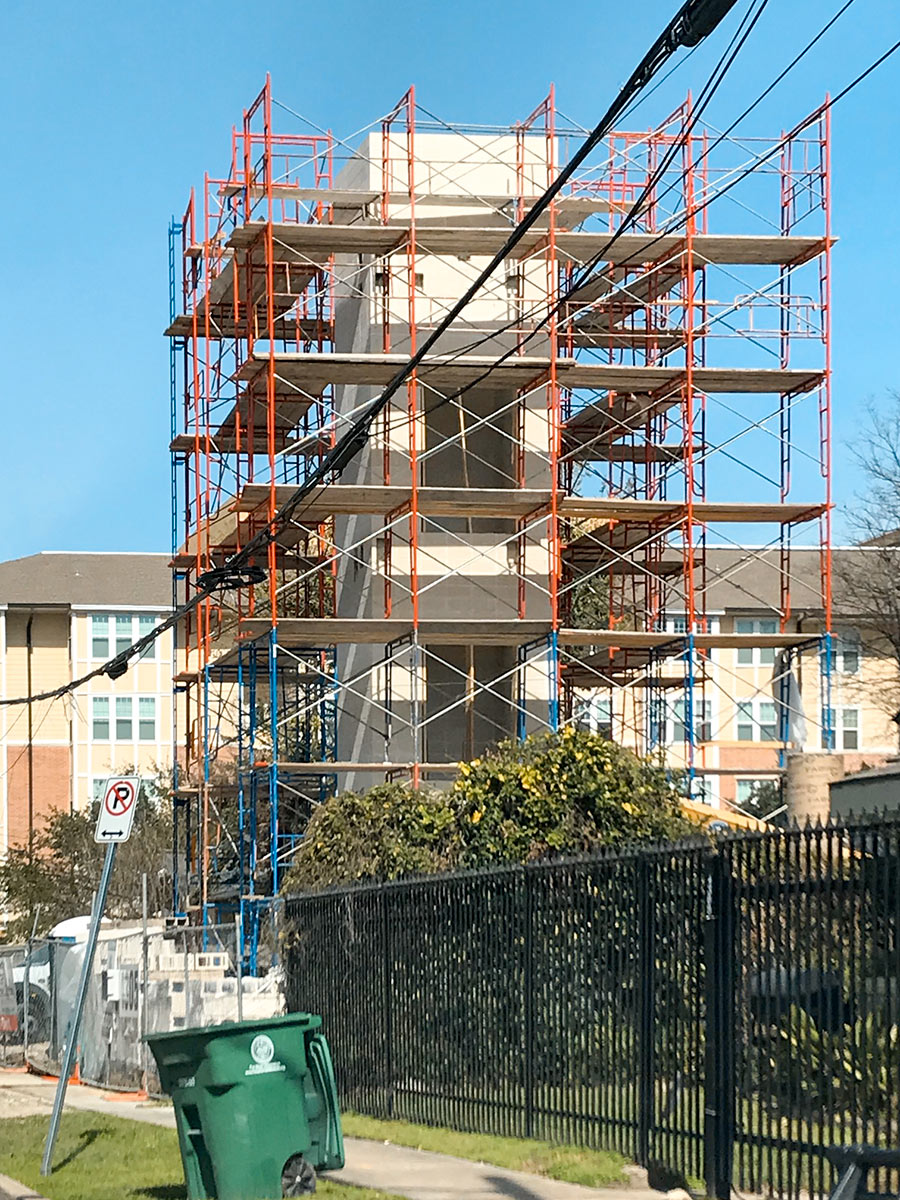
Wait. Didn’t this get bought a while back to be developed on? It was a big story. Everyone got their notice to vacate their vegetables. I guess that never happened?
There’s 0.00000000001% chance that any civic association can come up with money to buy a silly garden, but he tipped his hand by showing that he is willing to take a much lower offer (at least 20% lower) and the real estate code for “personal financial situation has changed” is that he’s insolvent and desperate to sell quickly.
@Cody- That was the garden near Washington Avenue, I think.
This was formerly my grandmother’s house for over 50 years. There’s a post on Swamplot somewhere about a fire that happened at the old house. In fact, it’s how I discovered the site. Back in 2008 we had a couple offers who wanted to build new single-family turned down by the Audubon Historic Society. At that time my grandmother was living with us, and homeless began living in the house. But we’re in a better economy now and with the house gone the historic society may have loosened their rein a bit. I hope it stays single-family (though I like the style of the townhomes down Stanford by Lovett); it is a beautiful neighborhood.
Different community garden…the vacate the veggies festival was at the Midtown Community Garden on Drew and Baldwin. This is the one in the nice part of town… Kind of sad really, there’s tons of great stuff growing in there and great amenities, but at least he’s only looking for a 100+ percent return on his investment. Maybe Urban Living can buy it as a garden and offer plots as concessions to buyers of all the townhomes they’re trying to build next to it. “Since you don’t have a yard, why not have one 4 blocks away…we’ll even throw in an UL logo wheelbarrow for you to carry your veggies home!” More attractive than a Best Buy giftcard!
@commonsense The only thing silly here are your assumptions. I thought you’d have more common sense than that. The article states that the community could fund the purchase of the lot with the civic association being the holder thus creating a real community asset paid for by the people who benefit from it most.
“My personal financial situation has changed” is code for “The property I bought on a whim doubled in value and now is the time to cash in on my windfall.”
why can’t the city of houston buy it with the park money they have been getting from developers/builders? they were looking at a lot on lower westheimer for the same money?
@William Winkler, the community could technically pay for it but it will never happen. There’s no way in green thorny hell anyone will fork over enough cash to do this, especially not the type of people who plant their own kale. If it is to be financed who will sign for the loan? Not any individual. Not the association. The $ is too much for a such project that will surely be an example of the “Tragedy of the Commons”.
I want to thank the owner for giving this neighborhood such a great space to enjoy! I understand needs change and I only hope someone will take on his efforts.
@commonsense you’ve clearly never visited this wonderful space and met the people that are so committed.
I would encourage everyone to stop by and experience this garden and meet the community that enjoys it daily
I think even $504,000 (20% off the $630,000) is a bit steep for the lot given the restrictions imposed by the historic district on new construction.
I think he’d do well to get $400,000.
@ William Winkler: Never mind commonsense or any of the other snarky comments on here from the people that seem to believe that no good deed should ever go unpunished. You are the owner of the land. Your financial circumstances and/or personal interests are your own business, nobody else’s.
There are lots of ways to structure a deal with a non-profit that you then hand off to other people. Talk to a good real estate attorney and they can probably give you a list of options that are feasible for you. I can recommend one if you’d like.
@Commnsense: it depends who the parties are. The Westbury Community Garden got the local Management District to help their efforts. Since the Management District has lots of experience in brokering land deals, they were more than ready to do that end of the deal. The Community Garden just had to come up with the money.
.
Of course, in Westbury it helped that the owner was the Houston Housing Authority – public entity subject to City Oversight (the community garden could and did lobby the City); and that building what the HHA wanted to build on the site meant public hearings where the loss of a community garden would surely be noted. But my point is, don’t write it off. The Audubon Place Community Garden could still be saved. They just need to get the right people involved, like Westbury did.
@Dream if they bought it as a park they couldn’t continue to use it as a “community” garden since they only service a handful of users
These community gardens discriminate against carnivores like myself. Sure, there’s plenty of land to grow your own kale, whatever that is, but where are the community stock yards and slaughterhouses? Why are plant killers given special treatment?
ZAW, isn’t that kind of the deal breaker here, that without city ownership they can’t commit any resources to it or help out in any way though. Mandell Place Park was able to make it work, but Castle Ct. had been managing the cities empty lot for years, if not decades, before finally able to get the right funding to make it happen. We need people here a lot more than we need pocket parks or greens though and the market will reflect that.
Without this garden, we wouldn’t even have a sense of community to figure out how to preserve. I grew up a block from this garden, and used to avoid walking my dog down the sidewalk along the abandoned, mostly burned down house that sat on this lot for as long as I can remember. I’ve had two plots since the garden opened in 2012. I’m optimistic about the garden remaining or perhaps turning into a different kind of community green space AND the owner of the land still being able to get a rewarding return on his investment. However it pans out, the garden has created a sense of community that this neighborhood hasn’t had in the 25 years I’ve lived here. Plenty of people investing in real estate would have let this lot sit empty while the land appreciates and the market bounces back from the recession, thank you William for putting so much of your time, energy, and money into making it a special place for everyone. Now that we know what it’s like, I think we’ll figure out a way to recreate what’s meaningful about the place somewhere else, if we can’t keep this particular space.
It’s nice to hear from people who like the garden. In my previous comment I mentioned that this lot would probably go to a home builder but now I’m not so sure. I think it would be cool if it was able to remain a garden or a park; heck, there’s already a coffeehouse down the street. I figure if the lot’s getting near market rent value from all of the garden tenants (and I’m sure there’s tax deductions in the picture too) then someone can make it happen.
Sarah: I don’t think commonsense has any issues with the garden, and likely thinks it’s a cool thing. I think he’s expressing some economic realities. Just because the garden is a good thing, doesn’t mean there is a realistic way for it to be purchased if the owner of the land decides to sell it on the market. The new owner will be the one that finds it the most valuable and is willing to part with real money to reflect that idea of value.
.
That party won’t likely be the gardeners. Though it would be cool if he were wrong.
If this were any other community garden then I’d be pessimistic of its future, but this isn’t some granola garden used by Poors in a rapidly gentrifying area. The neighborhood is made up of well-to-do people that could easily secure financing at that price, some of which rent plots in the garden. Plus the garden also rents plots to area restaurants. I know Radical Eats uses it. William spent A LOT of his time and money building that garden. He isn’t just going to offload it to UL.
A similarly-minded group managed to organize to raise the money to do a community garden at Mandell and Richmond. The land was a lot cheaper then…
This is a lovely garden and obviously loved by many in the area. Thank you Mr. Winkler for sharing the plot. If my lucky numbers are drawn Saturday, this would be my first purchase – to keep it as a garden. It was rather shameful the way the Midtown Community Garden was pushed out so hastily and now that lot sits empty only collecting violations for failure to keep it mowed. We need more areas like this beautiful garden where people can come together and share.
Good News! The City and I are negotiating their purchase of the lot. They are indenting to turn it into a neighborhood park. Many thanks to my broker Blake Hillegeist.
That’s very good news, William Winkler. Congratulations! Houston can always use more parks.
.
My experience is it will be a long, drawn out process (bureaucracy at it’s worst), but at least you’ve got the ball rolling.
.
I should note one thing here. A lot of people say Houston has a lot of parkland already; why build more? We could use that land to build more housing and make our city denser. We have a lot of parkland only because we have a handful of really huge parks: George Bush Park being the largest. Many Houston neighborhoods still suffer from a distinct lack of smaller, accessible parks. So despite the numbers, we really do need more green space in Houston. And hey, people like to be near parks. Build a park and you will attract people to the dense housing you’re building nearby!
Congrats on possibly getting the city to purchase it. It’s really not appropriate to keep it as a community garden at that point, but it could still be a nice park.
@ MrEction: Why wouldn’t it be appropriate for the City to manage a community garden at this location? They rent other facilities for private activities, so why not plots in a garden?
ZAW, if you feel Houston has a lack of parks then I might question why we feel the need to increase green space in a location that is 1mile away from one of our cities largest and premier park spaces and 1 mile away from an already city funded community garden. placement of green spaces is just as important as presence of green space. i feel this space is too small to develop anything of importance and would just be a stomping ground for dogs with very little utilization for kids or the denser population groups sitting closer to midtown in greater need. locations should be selected based on most value to the city and surrounding populations, not as opportunity prevails and at the height of property market cycles. as long as the city is applying the proper metrics and review cycles so as not to waste any money I’m fine with it.
@TheNiche: Because “public park”‘s first name is “public”. If people with lots of cash and not enough land want to rent some garden space, that’s fine, but it has nothing to do with a public park. Why would the city be involved in that kind of transaction?